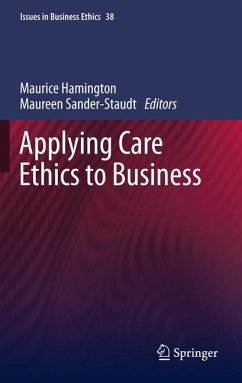
Business Ethics
Pearson New International Edition

PAYBACK Punkte
54 °P sammeln!
For courses in Business Ethics, Moral Issues in Business, Social Issues in Business, Business and Society, International Business Ethics, and Issues in International Business.
This systematic, integrated investigation of the field of business ethics is presented from an informed philosophical point of view. It argues that ethics is the glue as well as the oil that makes business possible, addressing the full gamut of issues: from such macro considerations as the moral justification of economic systems to such micro issues as proper computer use by employees.
Features + Benefits
Create a Custom Text: For enrollments of at least 25, create your own textbook by combining chapters from best-selling Pearson textbooks and/or reading selections in the sequence you want. To begin building your custom text, visit www.pearsoncustomlibrary.com. You may also work with a dedicated Pearson Custom editor to create your ideal text—publishing your own original content or mixing and matching Pearson content. Contact your Pearson Publisher’s Representative to get started.
Comprehensive, systematic coverage—Provides a wide range of issues in all areas of business, including marketing, finance, management, strategic planning, computer systems, and more.
Provides students with the tools they’ll need to approach moral issues intelligently.
Provides instructors with a flexible text, as they can emphasize the topics they choose.
Moral reasoning in business, moral issues within the corporation, and ethics and international issues.
Enables students to apply the standard ethical approaches in analyzing issues, problems, and cases.
Case studies—Open each chapter; these look at the ethical problems involved in an actual business situation.
Gives students a real-life perspective.
A global perspective.
Enables students to learn much from ethical practices in industrialized nations.
Solid pedagogy—Includes examples and study questions at the end of each chapter.
Enhances students’ learning experience.
Preface xi
Introduction
Chapter 1: Ethics and Business 1
Horatio Alger and Stock Options 1
The Myth of Amoral Business 3
The Relation of Business and Morality 5
Business Ethics and Ethics 9
The Case of the Collapsed Mine 18
Study Questions 20
Moral Reasoning In Business
Chapter 2: Conventional Morality and Ethical
Relativism 21
Purchasing Abroad: A Case Study 21
The Levels of Moral Development 22
Subjective and Objective Morality 24
Descriptive Relativism 26
Normative Ethical Relativism 27
Moral Absolutism 31
Moral Pluralism 32
Pluralism and American Business 33
Pluralism and International Business 33
Pluralism, Business, and the Law 35
Business and Religious Ethics 36
Approaches to Ethical Theory 38
Study Questions 41
Chapter 3: Utility and Utilitarianism 43
An Airplane Manufacturing Case 43
Utilitarianism 43
Act and Rule Utilitarianism 47
Objections to Utilitarianism 50
Utilitarianism and Justice 52
Applying Utilitarianism 53
Utilitarianism and Bribery 56
Study Questions 60
Chapter 4: Moral Duty, Rights, and Justice 61
The Johnson Controls Case 61
Deontological Approaches to Ethics 62
Reason, Duty, and the Moral Law 63
Application of the Moral Law 67
Imperfect Duties, Special Obligations, and Moral Ideals 71
Rights and Justice 73
Study Questions 81
Chapter 5: Virtue Ethics and Moral Reasoning 82
The Case of Dora and Joe 82
Virtue 82
Applying Moral Reasoning 87
Study Questions 97
Chapter 6: Moral Responsibility: Individual and Corporate 98
The Love Canal Case 98
Moral Responsibility 99
Excusing Conditions 100
Liability and Accountability 104
Agent and Role Moral Responsibility 106
The Moral Status of Corporations and Formal Organizations 108
Study Questions 112
Moral Issues in Business
Chapter 7: Justice and Economic Systems 114
The Case of the Two Slaveholders 114
Moral Evaluation of Economic Systems 115
Moral Evaluation of Contemporary Systems 119
Economic Models and Games 120
A Capitalist Model 121
Capitalism and Government 125
A Socialist Model 128
Comparison of Models and Systems 130
Economic Systems and Justice 131
Study Questions 133
Chapter 8: American Capitalism: Moral or Immoral? 134
The Case of Bill Gates and Warren Buffet 134
The American Economic System 136
Relation of the American Government to the American Economic System 138
The Marxist Critique 141
Non-Marxist Moral Critiques of American Capitalism 146
The Moral Defense of the American Free-Enterprise System 148
Non-Socialist Alternatives to Contemporary American
Capitalism 152
Philanthropy 156
Study Questions 157
Chapter 9: The International Business System, Globalization, and Multinational Corporations 159
The WTO and Agriculture: A Case Study 159
Justice and the International Economic System 161
The Globalization of Business 164
Multinational Corporations and Ethics 167
Ethical Guidelines for Multinational Operations 173
Multinationals and Human Rights 175
International Codes 176
Cross-Cultural Judgments, Negotiation, and International Justice 180
Study Questions 183
Chapter 10: Corporations, Morality, and Corporate Social Responsibility 185
The Case of Malden Mills 185
Privately Owned, Small and Medium-Sized Businesses 187
Concept of the Corporation: Shareholder versus Stakeholder 190
Moral Responsibility Within the Corporation 192
Corporate Social Responsibility 198
Corporate Codes 206
Corporate Culture and Moral Firms 208
Study Questions 209
Chapter 11: Corporate Governance, Disclosure, and Executive Compensation 211
The Enron Case 211
Corporate Governance 213
Corporate Disclosure 218
Insider Trading 224
Executive Compensation 233
Study Questions 237
Chapter 12: Finance, Accounting, and Investing 239
The case of Lehman Brothers 239
Mortgages, Risk, and Financial Institutions 241
Corporate Takeovers and Restructuring 249
Accounting 257
Ethical Investing 261
Study Questions 268
Chapter 13: Safety, Risk, and Environmental Protection 270
The McDonald’s Polystyrene Case 270
Corporations, Products, and Services 271
Do No Harm 272
Safety and Acceptable Risk 273
Product Safety and Corporate Liability 276
Strict Liability 277
Production Safety 279
The Transfer of Dangerous Industries to Less Developed Countries 280
Environmental Harm 287
Pollution and Its Control 289
Global Warming and the Kyoto Protocol 294
Study Questions 296
Chapter 14: Whistle-Blowing 298
The Ford Pinto Case 298
Blowing the Whistle 299
Kinds of Whistle-Blowing 300
Whistle-Blowing as Morally Prohibited 303
Whistle-Blowing as Morally Permitted 306
Whistle-Blowing as Morally Required 310
Internal Whistle-Blowing 312
Precluding the Need for Whistle-Blowing 316
Study Questions 317
Chapter 15: Marketing, Truth, and Advertising 319
Case Study: Direct-to-Consumer Drug Advertising 319
The Nestlé Infant Milk Formula Case 321
Marketing 322
Advertising 332
Truth and Advertising 334
Manipulation and Coercion 338
Paternalism and Advertising 340
Prevention of Advertising 342
Allocation of Moral Responsibility in Advertising 343
Study Questions 346
Chapter 16: Workers’ Rights: Employment, Discrimination, and Affirmative Action 348
The Case of the 2008 Presidential Election: The End
of Affirmative Action? 348
Employment-at-Will 349
Rights in Hiring, Promotion, and Firing 351
Discrimination, Affirmative Action, and Reverse Discrimination 354
Discrimination 356
Changing Social Structures 361
Equal Employment Opportunity 362
Affirmative Action 364
Reverse Discrimination 367
Balanced or Preferential Hiring 368
Study Questions 374
Chapter 17: Workers’ Rights and Duties Within a Firm 376
Case Study: Drug and Polygr
This systematic, integrated investigation of the field of business ethics is presented from an informed philosophical point of view. It argues that ethics is the glue as well as the oil that makes business possible, addressing the full gamut of issues: from such macro considerations as the moral justification of economic systems to such micro issues as proper computer use by employees.
Features + Benefits
Create a Custom Text: For enrollments of at least 25, create your own textbook by combining chapters from best-selling Pearson textbooks and/or reading selections in the sequence you want. To begin building your custom text, visit www.pearsoncustomlibrary.com. You may also work with a dedicated Pearson Custom editor to create your ideal text—publishing your own original content or mixing and matching Pearson content. Contact your Pearson Publisher’s Representative to get started.
Comprehensive, systematic coverage—Provides a wide range of issues in all areas of business, including marketing, finance, management, strategic planning, computer systems, and more.
Provides students with the tools they’ll need to approach moral issues intelligently.
Provides instructors with a flexible text, as they can emphasize the topics they choose.
Moral reasoning in business, moral issues within the corporation, and ethics and international issues.
Enables students to apply the standard ethical approaches in analyzing issues, problems, and cases.
Case studies—Open each chapter; these look at the ethical problems involved in an actual business situation.
Gives students a real-life perspective.
A global perspective.
Enables students to learn much from ethical practices in industrialized nations.
Solid pedagogy—Includes examples and study questions at the end of each chapter.
Enhances students’ learning experience.
Preface xi
Introduction
Chapter 1: Ethics and Business 1
Horatio Alger and Stock Options 1
The Myth of Amoral Business 3
The Relation of Business and Morality 5
Business Ethics and Ethics 9
The Case of the Collapsed Mine 18
Study Questions 20
Moral Reasoning In Business
Chapter 2: Conventional Morality and Ethical
Relativism 21
Purchasing Abroad: A Case Study 21
The Levels of Moral Development 22
Subjective and Objective Morality 24
Descriptive Relativism 26
Normative Ethical Relativism 27
Moral Absolutism 31
Moral Pluralism 32
Pluralism and American Business 33
Pluralism and International Business 33
Pluralism, Business, and the Law 35
Business and Religious Ethics 36
Approaches to Ethical Theory 38
Study Questions 41
Chapter 3: Utility and Utilitarianism 43
An Airplane Manufacturing Case 43
Utilitarianism 43
Act and Rule Utilitarianism 47
Objections to Utilitarianism 50
Utilitarianism and Justice 52
Applying Utilitarianism 53
Utilitarianism and Bribery 56
Study Questions 60
Chapter 4: Moral Duty, Rights, and Justice 61
The Johnson Controls Case 61
Deontological Approaches to Ethics 62
Reason, Duty, and the Moral Law 63
Application of the Moral Law 67
Imperfect Duties, Special Obligations, and Moral Ideals 71
Rights and Justice 73
Study Questions 81
Chapter 5: Virtue Ethics and Moral Reasoning 82
The Case of Dora and Joe 82
Virtue 82
Applying Moral Reasoning 87
Study Questions 97
Chapter 6: Moral Responsibility: Individual and Corporate 98
The Love Canal Case 98
Moral Responsibility 99
Excusing Conditions 100
Liability and Accountability 104
Agent and Role Moral Responsibility 106
The Moral Status of Corporations and Formal Organizations 108
Study Questions 112
Moral Issues in Business
Chapter 7: Justice and Economic Systems 114
The Case of the Two Slaveholders 114
Moral Evaluation of Economic Systems 115
Moral Evaluation of Contemporary Systems 119
Economic Models and Games 120
A Capitalist Model 121
Capitalism and Government 125
A Socialist Model 128
Comparison of Models and Systems 130
Economic Systems and Justice 131
Study Questions 133
Chapter 8: American Capitalism: Moral or Immoral? 134
The Case of Bill Gates and Warren Buffet 134
The American Economic System 136
Relation of the American Government to the American Economic System 138
The Marxist Critique 141
Non-Marxist Moral Critiques of American Capitalism 146
The Moral Defense of the American Free-Enterprise System 148
Non-Socialist Alternatives to Contemporary American
Capitalism 152
Philanthropy 156
Study Questions 157
Chapter 9: The International Business System, Globalization, and Multinational Corporations 159
The WTO and Agriculture: A Case Study 159
Justice and the International Economic System 161
The Globalization of Business 164
Multinational Corporations and Ethics 167
Ethical Guidelines for Multinational Operations 173
Multinationals and Human Rights 175
International Codes 176
Cross-Cultural Judgments, Negotiation, and International Justice 180
Study Questions 183
Chapter 10: Corporations, Morality, and Corporate Social Responsibility 185
The Case of Malden Mills 185
Privately Owned, Small and Medium-Sized Businesses 187
Concept of the Corporation: Shareholder versus Stakeholder 190
Moral Responsibility Within the Corporation 192
Corporate Social Responsibility 198
Corporate Codes 206
Corporate Culture and Moral Firms 208
Study Questions 209
Chapter 11: Corporate Governance, Disclosure, and Executive Compensation 211
The Enron Case 211
Corporate Governance 213
Corporate Disclosure 218
Insider Trading 224
Executive Compensation 233
Study Questions 237
Chapter 12: Finance, Accounting, and Investing 239
The case of Lehman Brothers 239
Mortgages, Risk, and Financial Institutions 241
Corporate Takeovers and Restructuring 249
Accounting 257
Ethical Investing 261
Study Questions 268
Chapter 13: Safety, Risk, and Environmental Protection 270
The McDonald’s Polystyrene Case 270
Corporations, Products, and Services 271
Do No Harm 272
Safety and Acceptable Risk 273
Product Safety and Corporate Liability 276
Strict Liability 277
Production Safety 279
The Transfer of Dangerous Industries to Less Developed Countries 280
Environmental Harm 287
Pollution and Its Control 289
Global Warming and the Kyoto Protocol 294
Study Questions 296
Chapter 14: Whistle-Blowing 298
The Ford Pinto Case 298
Blowing the Whistle 299
Kinds of Whistle-Blowing 300
Whistle-Blowing as Morally Prohibited 303
Whistle-Blowing as Morally Permitted 306
Whistle-Blowing as Morally Required 310
Internal Whistle-Blowing 312
Precluding the Need for Whistle-Blowing 316
Study Questions 317
Chapter 15: Marketing, Truth, and Advertising 319
Case Study: Direct-to-Consumer Drug Advertising 319
The Nestlé Infant Milk Formula Case 321
Marketing 322
Advertising 332
Truth and Advertising 334
Manipulation and Coercion 338
Paternalism and Advertising 340
Prevention of Advertising 342
Allocation of Moral Responsibility in Advertising 343
Study Questions 346
Chapter 16: Workers’ Rights: Employment, Discrimination, and Affirmative Action 348
The Case of the 2008 Presidential Election: The End
of Affirmative Action? 348
Employment-at-Will 349
Rights in Hiring, Promotion, and Firing 351
Discrimination, Affirmative Action, and Reverse Discrimination 354
Discrimination 356
Changing Social Structures 361
Equal Employment Opportunity 362
Affirmative Action 364
Reverse Discrimination 367
Balanced or Preferential Hiring 368
Study Questions 374
Chapter 17: Workers’ Rights and Duties Within a Firm 376
Case Study: Drug and Polygr
This interesting, comprehensive book about business ethics argues that ethics is the glue that makes successful business possible. It allows the reader to see the whole range of issues in business ethics rather than just selected topics. Its focus on internationalization and globalization is important, as it relates facts about this dynamic, growing aspect of corporate business. Business Ethics 7e not only covers ethics, it also includes such topics as: management, production, marketing, finance, workers rights, and environmental issues; it enables readers to see how all of the issues presented are interrelated. An excellent resource and reference text for international corporate employees, marketing administrators, and human resource managers and employees.
Dieser Artikel kann nur an eine deutsche Lieferadresse ausgeliefert werden.













